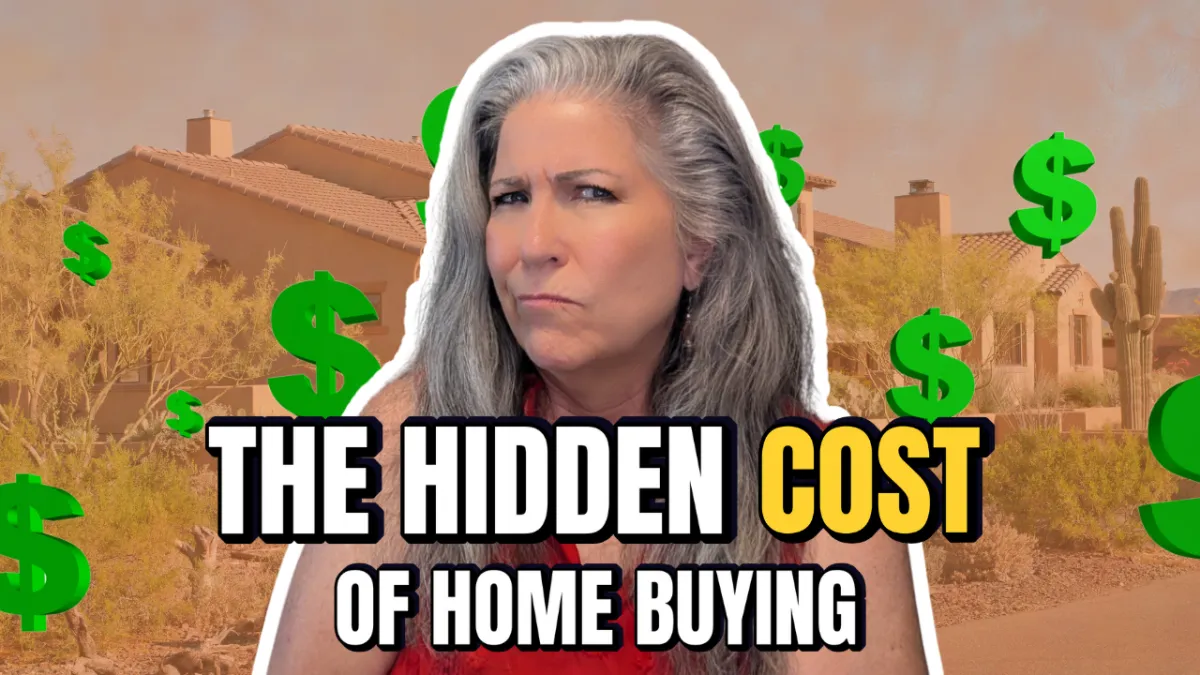
The Hidden Costs of Home Buying: What to Expect
👉 Watch the full video on YouTube!
Link:
Prefer to listen? Click to hear this post!
The Hidden Costs of Home Buying: What to Expect
[00:00:00] Did you know that buyers have expenses they need to pay before they get to the closing table other than their down payment and closing costs? A lot of my clients have questions about this and or surprise when I have that conversation with them. Hi, I'm Judith Barnett with. Judith Barnett Sells homes and my home group realty where real estate is done with compassion and integrity.
I just was having this conversation with some clients the other night when we were writing out their offer. They're ready to write their offer. We talked about closing costs. We talked about down payment. They wanted to know what their mortgage was gonna be with principal interest, homeowners, insurance, taxes, everything rolled in.
So we focused on [00:01:00] that. I answered all their questions, and then we talked about. Things that they may have to pay for or will need to pay for before we get to the closing table. And they're like, what? There's money we have to pay before we get to the closing table. And I said, yes, there are a number of things that buyers are responsible for paying and or things could come up that you are gonna need to pay for before you get to the closing table, which means you have to have cash.
Available to pay these expenses. We caution against using credit cards to pay for a lot of these things because if your debt to income is closed, you have to be careful about using your credit cards. So cash is your best option. I'm gonna tell you as many of the things that I run across that buyers have had to pay in advance and there could be more.
So it's really important that buyers are educated by [00:02:00] their agent about money they may need to have available to pay for these things that are paid for during the closing process. The number one, the number one expense that buyers don't realize that they have to pay is their earnest money. Earnest money is the buyer's skin in the game saying, Hey.
I am committed to buying this house, and I'm taking a risk by putting this money in that I may lose if I don't play the game properly. Earns money. Typically, I tell my clients, and it could be more, it could be less, but this is my kind of guideline and you can use it or not, but I tell my clients it's typically a thousand dollars for every hundred thousand dollars that you're offering on a purchase.
So if it's a $500,000 house, you are going to need to come up with $5,000 in earnest money. It cannot be on a credit [00:03:00] card. You can't go take out a loan. It has to be cash. So that can be an issue for some people. They didn't put that money aside, and that's the biggest chunk of money that most people pay out before they get to the closing table.
I do explain to them that this money is used. Towards your closing costs, down payment, that type of thing. And if you cancel the contract within the guidelines, you get the money back. Okay? So that is the biggest expense, and people are often surprised by that. The next expense that most people experience, and I highly recommend is a home inspection.
Home inspections are done during your due diligence period, and they cost. Depending on where you live and how big the house is, how many buildings they have to inspect. In addition, it can run anywhere from, say, 3 75 to a thousand dollars, depending on the [00:04:00] size of the house, number of buildings, that type of community you live in, that type of thing.
The next thing would be a termite inspection. I do a lot of VA loans. I live in a community where we have a lot of veterans, so a termite inspection is required by the lender. And again, that range is anywhere from $50 to over a hundred depending on what vendor you use. But that's out of pocket. And of course, there's always that lovely appraisal.
The buyer pays for the appraisal most of the time. Obviously, it could be negotiated in your purchase contract, but most of the time the buyer pays that. And again, that can run anywhere from $600 to over a thousand, at least in this area. Most of mine are running between six and 800. But those are very big expenses.
The earnest money, homeowners inspection, home inspection, termite inspection, and appraisal. [00:05:00] I just was helping a person calculate that and they're like, oh my gosh, I didn't know I had to have money now. I just thought I needed it. When I closed on the house in 30 days, so that can be a huge surprise. Other expenses would be, if it's an older home, you need to have the HVAC inspected.
Most vendors that do hvac do not do it for free. There's gonna be a charge. What that is depends on the vendor. Most recently, I think my clients paid $159 to have the HVAC inspected. Another fee could be. If you're buying a manufacturing home, you could be needing to pay for the HUD tags. You could be needing to pay for the data plate, you could need to be paying for the engineering certificate, and I just did one of those and that was $1,550 to have a new engineering certificate.
All of that costs money, and it is investing into the property financially before you even own [00:06:00] it, and there's no options. You have to do it now sometimes. You can negotiate some of these fees, like the HUD tags data plate and engineering certificate into the purchase contract, but be ready that you may have to pay for it if the seller doesn't have the funds or doesn't wanna do it.
Most of the time roof inspectors here in Arizona, roofing companies will come out and look at the roof for free. but again, oh, well, testing, oh my God. Well, and water testing. That is a big one here in Arizona because we have a lot of wells in this rural area where I work. So you have the water test and you have the well inspection.
Now again, if it's a conventional loan, you're not required to have a well inspection or the water tested, but I strongly recommend it. If you're FHA and VA or USDA, you do have to pay. You do have to have a well inspection and water test, and typically the buyer pays for that. [00:07:00] And that can range anywhere.
Usually it's around a thousand dollars with the well inspection and the water testing. The water testing is more expensive than the well inspection. I'm trying to think if there's anything else. Nothing else is coming to mind that are typical things. There's always other little things, but those are kind of the, the big, you know, net of expenses that a buyer can anticipate.
In purchasing a home, it's money. They're investing into the home even before they own it. So there's a lot of financial investment in keeping things moving forward. If you are already putting money into this house, I paid for a home inspector. I paid for an appraisal. I paid for the well to be inspected.
I paid for the HVAC to be evaluated. I'm into it, you know, $3,000. I really need to make this fit because I don't have $3,000 to do the next house. And that's a huge thing for clients to keep in [00:08:00] mind and their agents that they've already invested a lot of money. So how can we work with them to help them keep things going so that they can buy the home they've already invested money into?
I hope that this was helpful. I hope that it helps clients, buyers think ahead a little bit and put that money aside so that when the time comes and you're ready to buy that house, you not only have money for your closing costs and your down payment, but you have money for your earnest. Money, excuse me, earnest money.
You have money for those other fees that are basically a buyer's responsibility. I wish you the best. Please like and subscribe. Hello. Please let DM me reach out to me, comment if you have questions. I am happy to help. That's what I'm here for, is to be a resource for you in buying and selling real estate here in the Verde Valley.
Have a blessed [00:09:00] day.
💡 Ready to take the next step?
📘 Grab our free guides to help you make a smart purchase:






